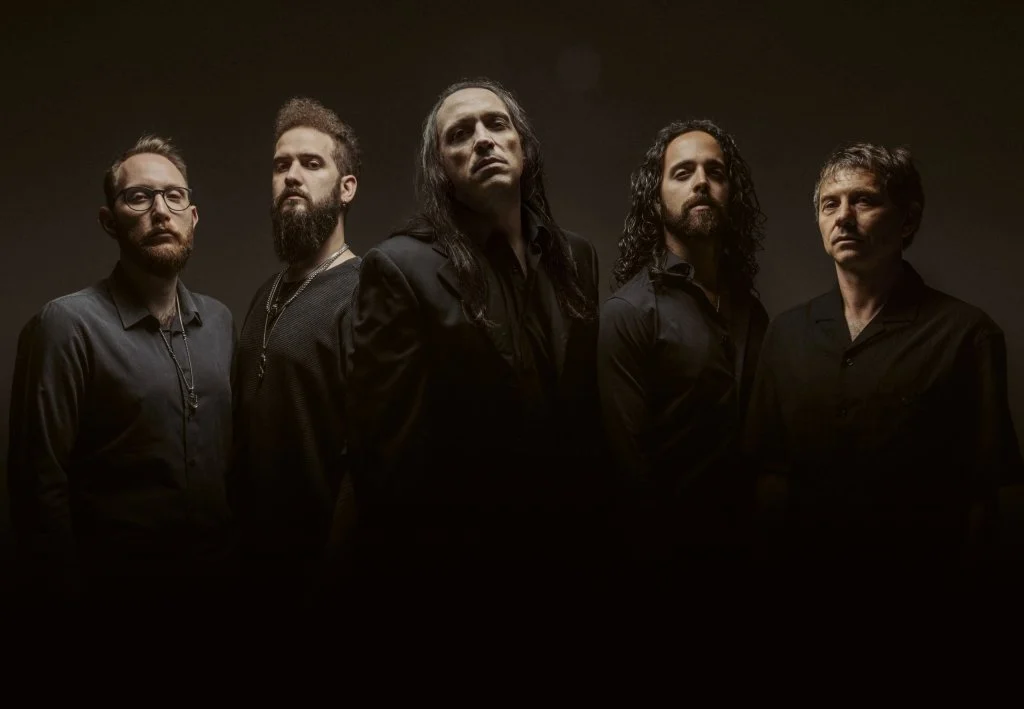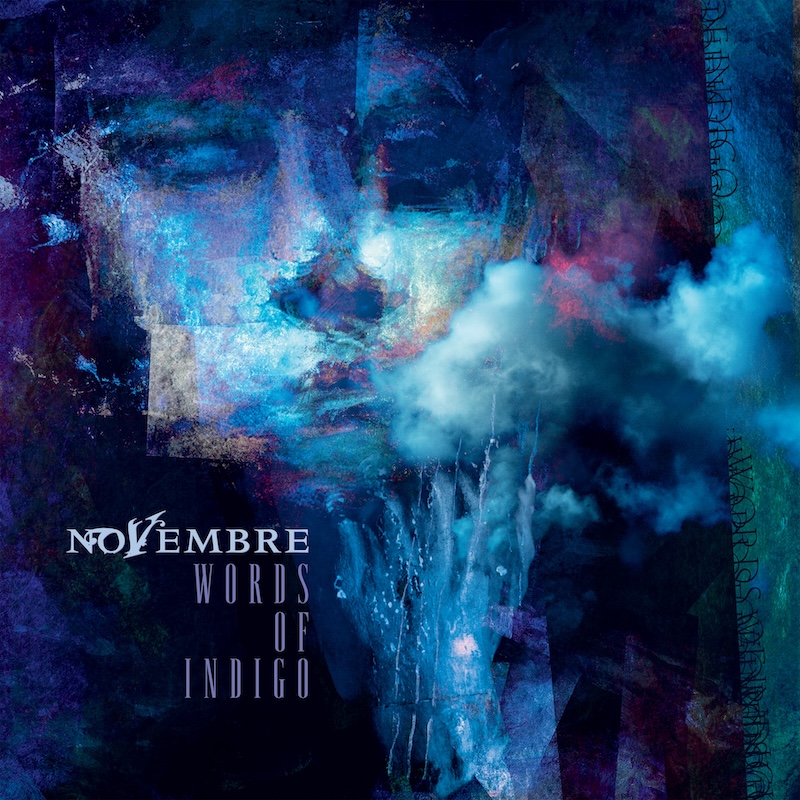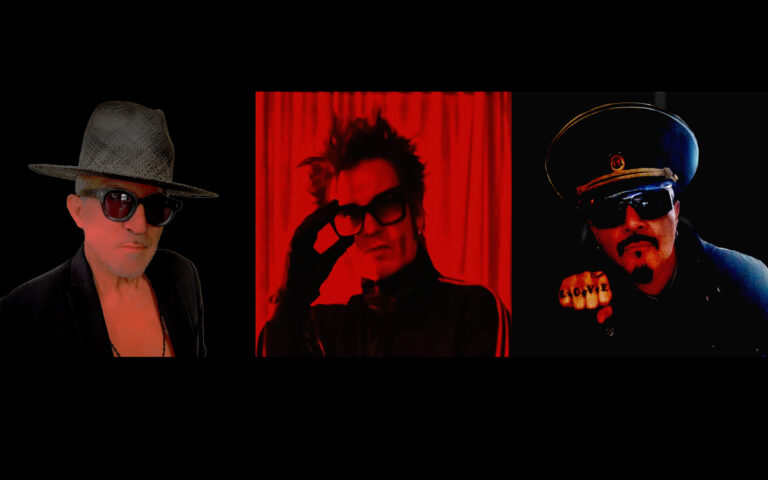Following a nine-year gap, Italian masters of melancholic, atmospheric doom Novembre finally returned with the recently released Words Of Indigo. A beautifully produced, slow-burning album that finds the band deftly weaving together the various elements that have made them so beloved over the course of their thirty-five-year history, it has garnered strong praise from across the board (SonicAbuse included), with everything from the stunning production of Dan Swano to the enigmatic artwork of Travis Smith contributing to its success.
We caught up with founding member Carmelo Orlando, who took time out to guide us through the creation of this magnificent album, the state of the music industry, and future plans for Novembre. Read on and embrace Words Of Indigo.

Congratulations on the new album. It’s wonderful to have you back. Time in the band seems to go quite slowly, I would say – it’s been some nine years since the last album, and you’ve had some line-up changes as well. So, in terms of developing the music, what is the initial process? Does it come from you bringing things to the band?
Well, yeah. I can say that I write single riffs pretty much every day and I use it as a sort of work out. And, you know, music comes to my mind, I record it, I store it for another day. And, you know, when it’s time to start composing – putting together everything – I open the folder and give a listen to everything, and I choose the best ones and from there on is the real challenge because single riffs and a whole song are very different things. You have to blend riffs together; you even have to blend songs together in order to get the album. And, so, we have the pieces pretty much ready and I bring that to the other guys in order to try to mould something.
That’s very interesting that you start with riffs and, as you say, to make an album, you have to blend ideas together. And your music is so layered, I sort of wondered if you, when you’re writing your riffs, whether you hear those other layers coming over the top of them, or if that’s something that comes later?
I do actually hear them and, you know, there isn’t… let’s say it’s ten years since we had this home recording technology, so I can record all of the layers that I hear whereas, in the past, you had to rely on your memory because you could just… I mean, I didn’t have anything to record on before the computers – before 2005 or something. That was a pain because I would lose a lot of music that I would hear in my head. Now it’s easier and you can store everything.
To my mind, your music is very cinematic and maybe that’s partly the way, over the years, that you’ve presented the albums and the artwork. When you get to the point where you’re choosing riffs and developing the album, do you have landscapes in your mind, visuals in your mind, or a theme that helps to drive the choice?
I think it forms eventually. But the short answer is yes. When a certain riffs comes up, it already carries a lot with it – landscapes and feelings and sensations. And the hardest part is not to lose it because, when you blend certain riffs with others, you risk losing its identity also. And, you know, you don’t want that. It would be a waste and it’s delicate, very delicate. Sometimes, some things can get lost in the process.
For me, particularly on this album, one of the things that I very much enjoyed is the way that it’s very measured and subtle in the way that the music evolves. At the beginning, the atmosphere is rather more melancholic, and then harder elements are fed in. When you’re developing the dynamic of the album, how do you approach the journey – the flow?
Well, you see, it happens in the process. I always try to keep a balance between the harder parts and more melodic parts. It’s very important and, perhaps in the past we lost track of this, and a couple of albums could have been more… they needed more attention in this regard. I think in this one, I spent a lot of time taking care of creating a balance to not overwhelm the listener with too much of this or too much of that.
Yeah, I spent a lot of time thinking about this.
I think, for me, it’s very important when you have a metallic passage that it has something to say, because I suppose that the overall idea of Novembre is to provide some catharsis – to take your feelings and create something out of them. I suppose that’s part of the challenge.
That’s part of the challenge of course and [laughs] I’m not sure I always deliver. I hope so! But oh man, it’s hard, it really is. It was a really challenging two years creating this album. Mostly because a couple of songs wouldn’t come together. Like the first one – I had to change a lot of things in order to have it like I really wanted it.
And yeah, here we are!
That’s interesting. When you went through the process of changing those songs, did you do that as individual pieces, or was that after the album started to come together – in other words, they changed to fit what was around them?
As part of the album. You always listen to pieces back-to-back and constantly I’d go jumping, running, I put it in my ears, and the job isn’t done until everything flows perfectly. With a couple of songs, it wouldn’t happen and I had to change a lot as I said and thank God for this technology that allows it. Because, you know, meeting with the guys in a garage is not always easy, with work and everything.
It’s a very good approach as well because I tend to find, when you’re playing heavier music, you can get very excited playing something that’s loud and powerful, but when you put it in an album, it doesn’t have the dynamic that you want, so being able to listen at home is really important.
Absolutely. That’s something that Dan Swano told us back in the day. When you write music, you have to think of it as an album as a whole, it must work from first to last song, otherwise it’s a mess. You can have a couple of nice songs but, overall, a terrible album, so… yeah!
It’s very nice to hear Ann-Mari Edvardsen back with you again on House of Rain – it has this amazing Dead Can Dance ambience to it. When it comes to choosing guests and bringing people into your creative sphere, do you have them in mind form the start of the music, or does it become evident form the music that you need someone to complete the sound.
I’ve got to be honest, the singer Anne-Marie is very important to me. She sang on two of the best albums that I ever listened in my life. Without her, there wouldn’t be any guests, I think. That song needed a female vocal, yeah sure, but it isn’t written in stone, you know. I met her again after a lot of years and we started talking and when she told me she’d be glad to participate, it was like OK, that’s it.
Otherwise, no. I don’t think I would look for another person.
You mentioned – it’s not a connection I’d have made – in the press materials for Your Holocene, you mentioned that it’s rooted in AOR. And that’s very interesting because it’s usually fans of a genre who tend to think that everything should stay within a genre, but artists will look to all sorts of different places from which to take influence. For you, I guess you have a very wide-ranging taste and that’s part of what makes Novembre unique, if you like?
Yeah, I noticed that. Things change with the time and experience. I remember like a couple of decades ago, a lot of metal heads from my generation didn’t want to even want to… you couldn’t bring up things like Duran Duran or The Cure because they’d be so hard core. But, when they started turning 40 or 50, they started posting all the 80s stuff in their socials and I told them, “What’s up with that?”
And they said “Oh, you know, you grow up and you start missing stuff in the 80s!”
So, yeah, I think being hard core, it changes with time. I think the younger guys would be only fucking metal! I think it’s normal. I was like that too at some point.
Obviously, over the history of the band, there’s been huge changes to the way the music industry operates, do you find it more challenging now to create an album in what some people seem to consider the era of streaming? Or do you find that because your fans are more likely to respond to an album, that the support is still there.
Yeah, I think it’s the latter. I wouldn’t even begin to know how to move in a different way. I recall having conversations about this with some guys in the music industry. They asked me, “what about streaming, do you have a lot of streaming?”
I said, “I don’t know, I just know that we sell CDs.”
Apparently, there are bands that rely only on streaming. But we still sell CDs and I noticed that this is a pattern that is consistent with the older bands. I read somewhere that Coroner, for instance, is in the charts with the new album. It’s selling thousands of physical CDs and new bands can only dream about that. Perhaps the new bands, they have a lot of streaming, but they don’t sell anything physical.
But, you know, thank God for The Cure, they sold tonnes of CDs for the last album (sorry if I stray from metal sometimes). [laughs]
I love The Cure; I’m right there with you!
But you know, I’ve read articles about this, that older bands still sell a lot of physical stuff. So, yeah, that’s it. The new way, I wouldn’t know how it works. I think that fans of the new bands are less passionate, because they wouldn’t pay for an actual thing. They go on YouTube, the counter goes up and up, and they still pay nothing. I don’t know, it’s crazy, really.
It’s an interesting question. Is it longevity in older bands? Or is it because bands of that era really pay attention to what it means to have an album from the artwork to the packaging to the sequencing and maybe some bands are paying less attention to that…
Yeah, I think so. When I love an album, I must have it. I ordered the new Coroner album – I still keep mentioning that album because it’s an unbelievable surprise these days.
There’s an element as well – it’s rarer now, but I still have label loyalty. So, for example, Peaceville, I know that if it’s on Peaceville, it’s almost certainly going to be something I love. And there were more labels like that in the past, but there are still some that support the creation of albums and, to go with that, really nice physical editions that represent the albums.
True. Yes, they’re very passionate about that and I’m so proud that we’re still working together.

Within that, one of the people who’d worked with Peaceville a lot is Travis Smith and the artwork for this is just stunning. So, I’d like to know how much of a role you took in creating the brief for Travis and how much he was able to interpret that to make it what it is.
Well, I don’t have a very imaginative visual side. So, when I create music, I see colours, I see sensations. Not so much in the visuals. I gather photographs from the internet, trying to catch a clue or something. This time around, nothing came. So, I just gave him a demo of the album and the lyrics and he came up with the cover. He came up with the cover and a few more options which I didn’t even look at because that one is so great, you just ignore the rest and go for it.
Yeah, the man is incredibly talented, yeah.
I love that process because different artists approach things in such different ways and you can have an idea in your head. But the fact that your music and your lyrics created that vision in him is, I think, a really cool way of working and maybe you got something you didn’t expect, but it gave the album it’s visual identity.
That’s true. That’s true and that’s something that I’m proud of. Thank God there’s him. Because I’ve seen other artists and I’ve got to say, I’m not amused at all. I don’t like them. There’s no one really interesting. So, let’s hope he doesn’t retire anytime soon. [laughs]
It’s one of the interesting thing about music in general is that you have to have a lot of trust and understanding between the people doing the mix, the people doing the master, the people doing the art. As a songwriter, you influence a lot of what happens, but then it can be taken so many different ways by all the other people who have to be involved in the process.
That’s true. There was a time when Dan Swano was retired and that was a problem because every time, we would record an album with the high risk of it being ruined by someone who wouldn’t understand what was going on.
I mean, no offence to anyone but, take an album like The Blue, it was dealt with like we were Sentenced. And it didn’t work. There was too much compression. It was a great sound if you had simpler songs. So, you have to take into account what is being played, also, otherwise it’s bad.
When Dan started working again, we solved these problems but, it can happen any day that you lose one of these partners that you’re lost. You have to mix it at home; that’s the only solution. And I’m not sure about the results, also.
It can make you quite vulnerable because, when egos get involved and you’re trying to express what you want and someone else really doesn’t understand that it can create a lot of conflict. And I know that some artists thrive on conflict, but others will simply retreat and then grind their teeth after. So, if you have those people, it’s amazing. But if not, then it’s hard.
Absolutely, it’s a matter of luck. In this period of our career, we are lucky. We have Dan and Travis. Without them, I don’t know [laughs] really. For the mix and the visuals, I wouldn’t really know.
You have this new album, but you’re also celebrating 35 years as a band. Do you have an idea to do anything with that? Or will you promote the album first and celebrate the history of the band later on?
Well, to be frank with you, I don’t think we’re going to celebrate at all. That’s something that was written for the press release, but there’s not going to be any party or anything like that! I’m not good at keeping track of these things also [laughs].
That’s the second time a press department have dome that to a band. I was interviewing someone else and they said almost the same thing, like “yeah, we don’t care!”
[Laughs] Yeah, I mean it’s OK. They do remind us, and I’m happy because otherwise we wouldn’t know, really. I just know that we changed name from Catacomb to Novembre in 1994. That’s it.
Is this going out on tour and, if so, for how long?
There are a couple of guys that are working on something so, sooner or later, you’ll have some news about that. Things are moving in that direction, yes.
It feels like it’s getting harder to put together tours even just before COVID. Certainly, in England, we’re losing venues and the ones that are still there are booking further ahead. So, where you’d release an album and book a tour, now you have to almost book the tour before the album’s finished. Is it harder for you than it was?
I really have no idea because I don’t deal with these things and there are others who do. But they told me that it’s like you say – things are different for some reasons. Of course, England is harder to reach – Brexit and everything. And there are conflicts also, so half of Europe is not available at the moment. It’s even harder to think about going to Türkiye than in the past. People from Türkiye would get in touch and be like, “hey, let’s have a concert!” But now, not so much. So, yeah, I think also the political situation is having an impact on this.
My final question is, it’s been a long time since the last album, and I know that this one is just out. But do you foresee that it’ll take as long before you return to the studio, or do you hope that things will move a little quicker?
Yeah, definitely quicker, because now we have a new line up. I don’t think another COVID is going to come to ruin things and stop us so, you can be sure that… give us one and a half years / two years and a new album will come up for sure.
Thank you so much, it’s been lovely speaking with you.



